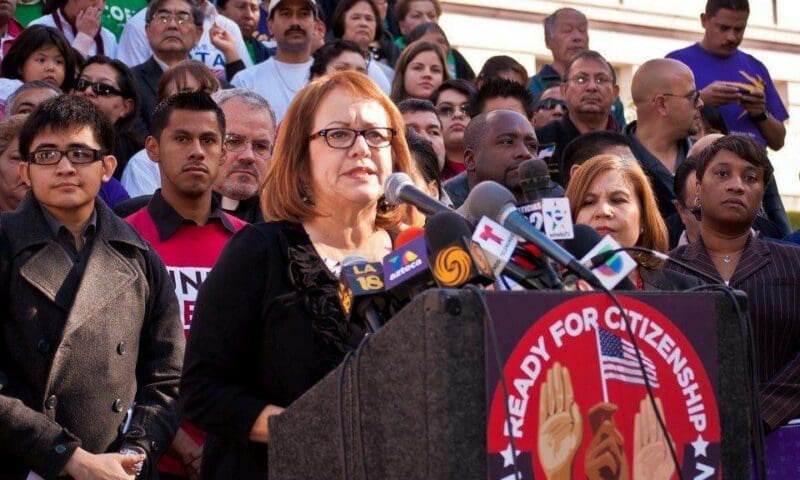
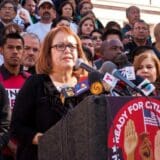
Seven years ago María Elena Durazo, the head of the Los Angeles County Federation of Labor, stood on a stage erected at the intersection of Wilshire Boulevard and La Brea Avenue, facing a sea of demonstrators who had just paraded miles in support of immigrant rights. In the twilight of that May Day, as Durazo addressed several hundred thousand people, the march for immigration reform seemed unstoppable – an irresistible historic tide that was poised to sweep away any objections.
Then came an angry backlash that saw anti-immigrant legislation passed in Arizona and Alabama that made Proposition 187 – California’s 1994 ballot initiative curbing immigrant rights – seem tame by comparison. Frying Pan News sat down with Durazo to discuss the pending immigration bill in Congress, as well as a new student film competition that her organization is sponsoring with UNITE HERE, a union whose members are largely immigrants.
» Read more about: The New America: A Talk With María Elena Durazo, Part 1 »


Many of you soon-to-be college graduates are determined to make the world a better place. Some of you are choosing careers in public service or joining nonprofits or volunteering in your communities.
But many of you are cynical about politics. You see the system as inherently corrupt. You doubt real progress is possible.
“What chance do we have against the Koch brothers and the other billionaires?” you’ve asked me. “How can we fight against Monsanto, Boeing, JP Morgan and Bank of America? They buy elections. They run America.”
Let me remind you: Cynicism is a self-fulfilling prophesy. You have no chance if you assume you have no chance.
“But it was different when you graduated,” you say. “The Sixties were a time of social progress.”
You don’t know your history.
When I graduated in 1968, the Vietnam War was raging. Over half a million American troops were already there.
» Read more about: College Graduates: Cynicism Is a Self-Fulfilling Prophesy »
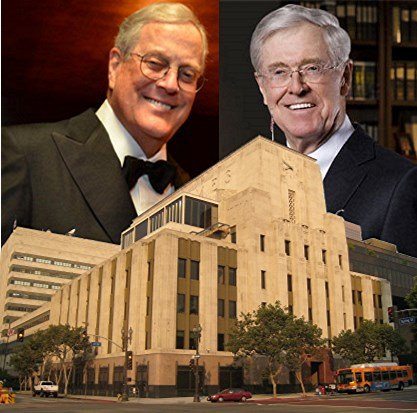

The L.A. Times has not exactly been falling all over itself lately to curry favor with the city’s labor movement, with a seemingly endless stream of news stories, columns and editorials portraying unions in a less than sympathetic light. So the last thing one might have expected to see was a rally of workers and labor leaders coming to the defense of L.A.’s paper of record.
But desperate times call for desperate measures – and with the Koch brothers potentially poised to take over Spring Street, the present moment certainly meets the test.
In case you have tuned out the Times and every other source of local news, Charles and David Koch – patron saints of the Tea Party, best friends to climate change deniers and bankrollers of an endless parade of far-right causes – have set their sights on the Tribune Company’s empire. After emerging from a bankruptcy brought on by the rapacious practices of former owner Sam Zell,
» Read more about: Desperate “Times” at Anti-Koch Brothers Rally »


[Frying Pan News Note: A New York Times piece posted last night by Steven Greenhouse — and referenced below — revealed that “newly found documents indicate that apparel had been produced for Walmart at one of the operations in the factory building that collapsed last month.”]
The most dangerous job in the world, outside war zones, isn’t that of an undercover police officer or a firefighter or a bullfighter or aerialist. It’s sewing garments — particularly in Bangladesh.
The death toll in the April 24 collapse of Rana Plaza has topped 1,100 and continues to rise. But Rana Plaza is merely the most deadly of an unbroken string of preventable disasters that have plagued garment manufacturing in Bangladesh, the world’s second-largest exporter of clothing, behind only China. It’s not even the most recent preventable disaster: Since the cataclysmic building collapse,
» Read more about: Harold Meyerson: Walmart and Bangladesh’s Death Traps »

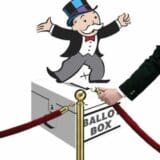
 Driven by disgust for the way our democracy seems to be for sale to the highest bidder, several dozen activists from Los Angeles gathered in Mount Washington this past Saturday to rally support for Proposition C, a symbolic measure on the May 21 ballot that urges area legislators to push for renewed limits on political campaign spending.
Driven by disgust for the way our democracy seems to be for sale to the highest bidder, several dozen activists from Los Angeles gathered in Mount Washington this past Saturday to rally support for Proposition C, a symbolic measure on the May 21 ballot that urges area legislators to push for renewed limits on political campaign spending.
In late February, the Los Angeles City Council voted 10 to 1 to put the following question on the ballot, introduced by Councilmember Richard Alarcon, who represents the northeast San Fernando Valley and who attended the Mount Washington gathering:
“Shall the voters adopt a resolution that there should be limits on political campaign spending and that corporations should not have the constitutional rights of human beings and instruct Los Angeles elected officials and area legislative representatives to promote that policy through amendments to the United States Constitution?”
By itself,
» Read more about: Making a “C” Change in Campaign Spending »
Yesterday members of Warehouse Workers United and their supporters confronted Scot Rank, the CEO of scandal-plagued Walmart de Mexico, at UCLA’s Anderson School of Business. The warehouse employees are fighting for improved working conditions at warehouse facilities operated by Walmart contractors. This raw video captures the protest.
» Read more about: Walmart de Mexico CEO Confronted at UCLA »
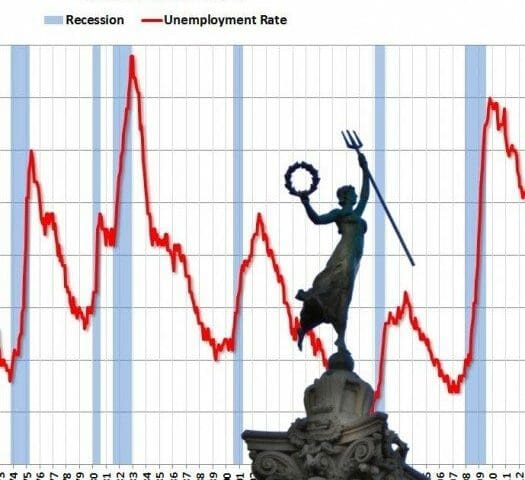

Some 53 percent of Americans say that the second Iraq war was a mistake. A recent Los Angeles Times article asked if the war brought change for the better. But no one asks what that war cost this country. The first trillion dollars we spent on it was only a down payment on what experts have estimated to be probably two trillion or more that we will spend over the next few decades to take care of America’s wounded and maimed. Our taxes provide care for those veterans, but both parties regularly propose cutting the Department of Veterans Affairs as a quick fix to balance the federal budget.
Covering the interest on the debt from this and other wars is a part of the budget Congress can’t cut, and it’s not cheap either. Every year taxpayers shell out an amount equal to six percent of the national spending plan just for interest on the national debt.
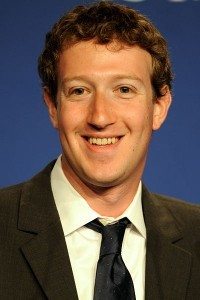

Within about a month of the debut of Fwd.us, Mark Zuckerberg’s new DC lobby outfit aimed at promoting immigration reform, the group is already falling apart. If this week is any indication, the meltdown will be as spectacular and ignoble as every other ill-conceived, overfunded start-up in the Valley.
Fwd.us’ political problems began the way they usually do: with a cynical, too-cute-by-half strategy adopted by his Beltway proxies. Fwd.us’ approach amounted to this: Buy the votes of key lawmakers by dumping money into ads in their home states on issues that are useful to them but that Mark Zuckerberg doesn’t care about.
What that has meant in practice is running commercials supporting South Carolina Senator Lindsey Graham for his bold opposition to Obamacare and his support of the Keystone XL Pipeline, and applauding Alaska Senator Mark Begich for his support for drilling in the Arctic National Wildlife Refuge.
» Read more about: Mark Zuckerberg’s Fwd.us Fail No Surprise »
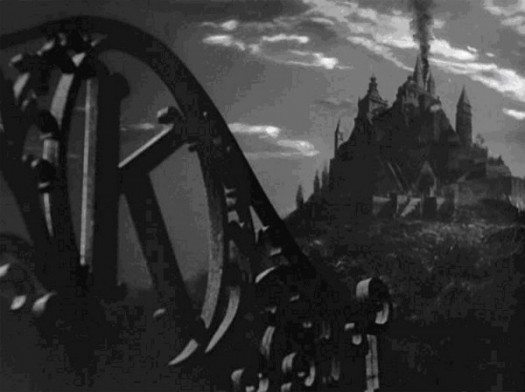

From time to time we may gripe about individual stories or columns that appear in the Los Angeles Times, but it remains our city’s paper of record and a powerful source of investigative journalism – at a time when such journalism has rapidly given way to rumor-sourced blogs written by dilettantes or pundits. That the Los Angeles Times may become the private toy of America’s most partisan conservative interests is not just a bad dream — right-wing billionaires Charles and David Koch may actually soon be running the paper, and it’s up to all of us to stop them.
It’s difficult to overstate how damaging it would be if the Koch brothers succeed in buying one of the country’s most influential newspapers. The Koch brothers would almost certainly use the Times to promote their ultra-conservative agenda. That would mean the end of fair,
» Read more about: Stop the Koch Brothers’ L.A. Times Takeover »
On the most recent Moyers and Company, Bill Moyers turned his attention to the ways underdog communities have organized themselves to win economic victories – in often hostile political environments. Moyers first spoke with Marshall Ganz, the veteran civil rights and United Farm Workers organizer; he then interviewed Madeline Janis, co-founder of the Los Angeles Alliance for a New Economy, and affordable-housing activist Rachel LaForest.
Ganz, a professor at Harvard’s Kennedy School of Government, based his organizing techniques on the moral teachings of his father, who was a rabbi, and on the need to transfer personal narratives onto organizing campaigns. Janis and LaForest have combined traditional organizing techniques with the practical need to adapt to fluid local situations.
As Janis told Moyers:
“You have a struggling housekeeper in a hotel who cleans 25 rooms in a day and barely puts food on the table. The idea of her being able to fight for better working conditions — a union in her hotel,
» Read more about: LAANE’s Madeline Janis Appears on “Moyers & Company” »